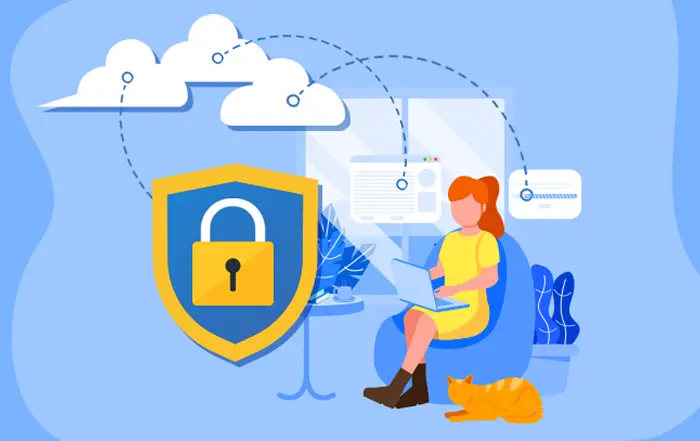Remote work has rapidly transitioned from being a trend to becoming a necessity, and for many businesses, it is a permanent change. This shift has brought significant advantages, including greater flexibility, reduced overhead costs, and access to a broader talent pool. However, it has also introduced serious cybersecurity challenges. Employees are now connecting from home networks, personal laptops, and mobile devices, often beyond the reach of traditional IT security measures.
This situation creates numerous opportunities for cybercriminals to exploit vulnerabilities. This is where endpoint security comes into play. It serves as a virtual security guard for every device connected to your business network, protecting against data breaches, malware, and unauthorized access, regardless of where your team works. In today’s remote-first world, endpoint security is an essential shield. Connect with Managed IT Services Boston experts to secure your remote data with strong endpoint protection.
In this blog, we will explore endpoint security, its importance, and ways it helps protect your organization from the growing risks of remote work.
What is Endpoint Security?
Endpoint security means protecting devices that connect to a company’s network, including laptops, smartphones, desktops, and tablets. It involves using security software and protocols to prevent unauthorized access, detect threats, and ensure data integrity on these devices. By securing endpoints, businesses can safeguard against cyberattacks like malware, ransomware, and data breaches, especially in remote work environments.
Why Endpoint Security Is Important for Business?
As more employees work from home or travel, every device can be a way into your company’s network. Without strong endpoint security, your business is vulnerable to cyberattacks that can steal data, disrupt operations, and damage your reputation. Here’s why endpoint security is essential:
- Protects Sensitive Business Data: Keeps customer info, financial records, and company secrets safe from hackers.
- Prevents Malware and Ransomware: Blocks harmful software that can lock you out of your systems.
- IT Supports Remote Work Safely: It secures personal and work devices, regardless of the location of your team.
In short, endpoint security gives your business the essential protection to thrive and operate securely in today’s digital, remote-first environment.
7 Ways Endpoint Security Helps Mitigate Remote Work Risks
Keeping company data and systems safe is essential since many people work from home. Endpoint security is crucial in protecting employees’ devices, whether they work from home, are on the go, or use personal devices to access corporate networks. Below are ways that endpoint security helps mitigate the risks associated with remote work.
- Blocks Malware and Ransomware Attacks
Malware and ransomware attacks are some of the biggest business threats, primarily when employees work remotely. Endpoint security blocks these threats before they can damage your systems.
- Malware Protection: Endpoint security tools continuously scan devices for harmful software, such as viruses, spyware, and trojans, that could steal data or cause disruptions.
- Ransomware Defense: With remote work, the risk of ransomware attacks, where hackers lock your data and demand payment to unlock it, has risen. Endpoint security detects ransomware activity and stops it before it can encrypt your files.
- Enforces Secure Authentication with MFA
Secure authentication is critical in protecting sensitive data, especially when employees access systems remotely. Multi-factor authentication (MFA) adds an extra layer of security beyond just passwords.
- Extra Layer of Protection: With MFA, users need more than just a password to access corporate resources. They may be required to verify their identity through a second method, like a text message, email, or authentication app.
- Reduces Risk of Unauthorized Access: Endpoint security requires multiple forms of verification, ensuring that even if a password is compromised, unauthorized users cannot easily gain access to the system.
- Easy to Implement: Setting up MFA for remote workers is relatively simple, yet it dramatically enhances the security of online accounts, systems, and data.
- Encrypts Data on Remote Devices
Employees who work remotely may access sensitive company data on their laptops, tablets, or smartphones. Endpoint security ensures that this data is encrypted, so it remains safe even if a device is lost or stolen.
- Data Protection: Encryption makes the data unreadable to anyone who doesn’t have the decryption key. Even if someone gains physical access to the device, they won’t be able to view or steal valuable information.
- Protects Confidential Information: Remote workers often handle sensitive client data, financial records, or proprietary company information. Encryption ensures that this data stays secure, no matter where it’s stored or transmitted.
- Compliance: Encryption helps organizations meet industry regulations, such as HIPAA, requiring strong data protection, primarily when employees work remotely.
- Insider Threat Prevention
While external cyberattacks get the most attention, insider threats are just as dangerous. Whether malicious or simply negligent, employees can risk company data. Endpoint security helps mitigate this risk.
- User Behavior Monitoring: Endpoint security can track user activities and flag suspicious behavior. For example, the system can alert IT if an employee tries to access data they typically wouldn’t need for their job.
- Prevent Data Leakage: Endpoint security prevents employees from accidentally or intentionally sharing confidential data with unauthorized individuals, especially when working remotely.
- Control Over File Sharing: Endpoint security restricts file-sharing activities, limiting the ability to send sensitive information through unsecured channels like personal email.
- Protects Internet Access with VPN Integration
When remote workers access the internet or company networks, there’s always a risk of data interception. Endpoint security often includes Virtual Private Network (VPN) integration to secure online activity.
- Encrypted Internet Traffic: A VPN encrypts the connection between remote workers and company servers, ensuring that data sent over the network is safe from prying eyes.
- Protects Public Wi-Fi: Many remote employees work with unsecured Wi-Fi networks from cafes, airports, or other public spaces. When using public networks, VPNs safeguard against cyberattacks, such as man-in-the-middle attacks.
- Access Control: Endpoint security with VPN integration ensures that only authorized users can access company systems, adding an extra layer of protection.
- Security Updates and Patch Management
Outdated software is one of the most common vulnerabilities in cybersecurity. Endpoint security ensures that devices are constantly updated with the latest security patches, reducing the risk of attacks.
- Automated Updates: Endpoint security solutions automatically install the latest updates and patches, ensuring that devices always run the most secure software versions.
- Vulnerability Management: By regularly updating and patching software, endpoint security helps protect remote workers from known vulnerabilities that hackers could exploit. If you are looking for strong security updates and proactive patch management, contact the IT Support Boston team.
- Monitors Threats in Real Time with EDR
Endpoint Detection and Response (EDR) systems monitor devices continuously for signs of malicious activity. With real-time threat detection, endpoint security can quickly respond to emerging risks.
- Active Threat Monitoring: EDR systems track activity across all remote devices and alert security teams to suspicious behavior, such as unusual file access or unauthorized login attempts.
- Incident Response: If a threat is detected, EDR systems can respond immediately by isolating the device, blocking malicious processes, or even notifying IT to take further action.
Final Thoughts
Securing your business involves more than just using strong passwords. Endpoint security acts like a digital bodyguard for your team, blocking harmful attacks, protecting sensitive data, and making sure every device stays up-to-date and secure, no matter where your employees are working from. Knowing that your business is protected from the growing risks of remote work gives you peace of mind, allowing your team to concentrate on performing at their best without the worry of security threats.






